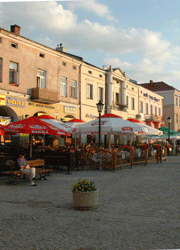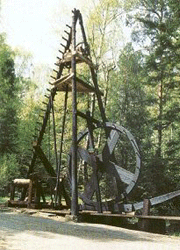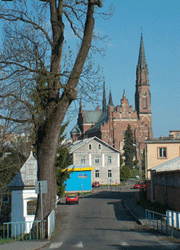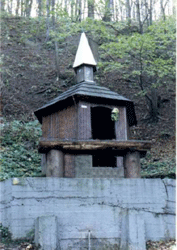 |
|

KROSNO
the old medieval town, formerly called small Krakow, has been for centuries an economic and cultural centre of a wast territory. The foundations for the town prosperity were laid from 15th to 17th century by numerous royal privileges and by it being positioned on important transport routes, mainly by the route running towards the Dukla Pass.
The utmost importance for the economic recovery had the launch of a large-scale oil exploration nearby Bobrka at the beginning of the second half of the last century initiated by the inventor of the oil lamp Ignacy Łukasiewicz, but also the launch of the Subcarpathian railway.
The exact date of the town foundation is not known. The origins of Krosno settlement are lost in the mists of the past. For the first time it was mentioned in a document issued in 1282. Krosno was granted municipal charter by the king Casimir the Great. Krosno has many heritage monuments, churches from the fifteenth and seventeenth centuries and the Museum of Oil Lamps.

BÓBRKA
In 1845, 15km northwest of Iwonicz, Ignacy Łukasiewicz together with Tytus Trzecieski and Karol Klobassa founded the world's first oil mine. The open-air museum exhibition is spread over 1 km. It features facilities and equipment illustrating the development of oil industry from its inception to the present.

KORCZYNA
a village, 21 km away, was a large settlement. Its oldest traces date back to the Neolithic period. The current settlement was established in the fourteenth century based on Magdeburg Rights. The village was the property of the heirs of Kamieniec castle in Odrzykoń. Odrzykoń-based Kamieniec Castle, once a mighty fortress defending the south-eastern reaches of Poland, was built in the fourteenth century by the king Casimir the Great. In the 17th century the castle was severely destroyed by Swedish and Transylvanian armies.
Still, more damage was done by two quarrelling families, the owners of the castle, the Skotnickis and Firlejs. Documents of the dispute provided Aleksander Fredro with a story he wrote about in his comedy of manners called "Revenge".

DUKLA
18km away from Iwonicz Zdrój lies the town Dukla. The town located at the old Hungarian Route was already known in the fourteenth century. It is possible that in ancient times there was a settlement there, for it is along this pass that one of the Roman trade routes ran, as evidenced by the finds of objects of Roman origin. Dukla received municipal charter in 1380.
On a hill in the northern part of the town, there is the Bernardine Monastery of the eighteenth century, which was visited by John Paul II. Not far from it, behind the monastery garden, there are large World War I and World War II cemeteries which are the burial place of 9300 Soviet, Czechoslovakian and Polish soldiers killed in the years 1939-1944.
| |
 |
|
 |
|
 |
|


